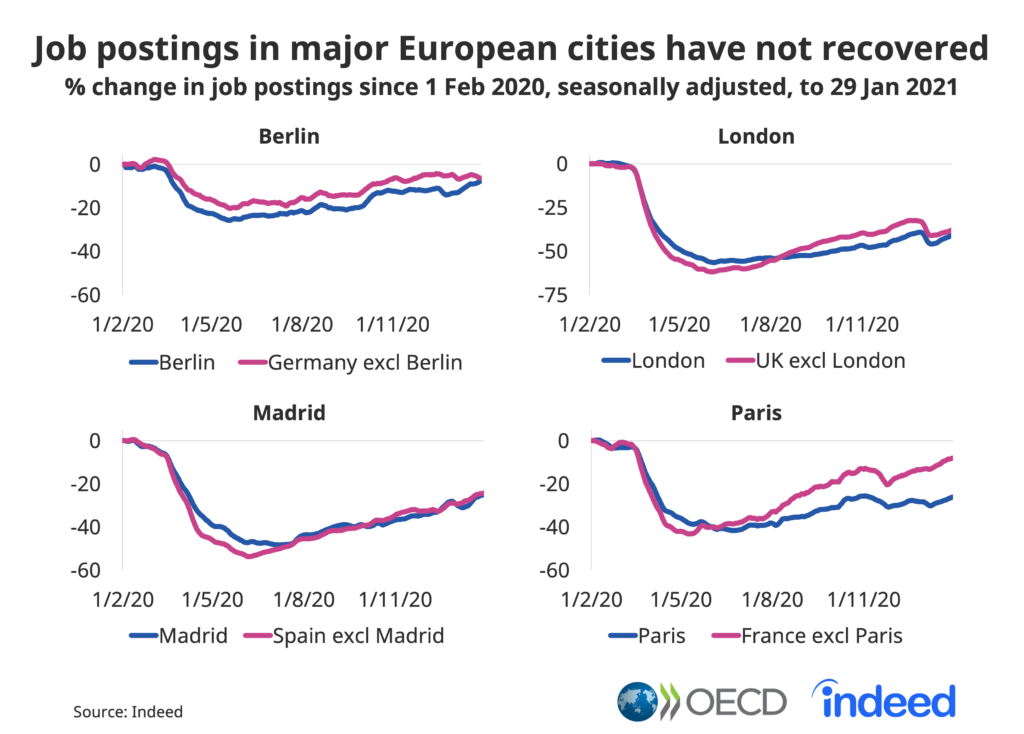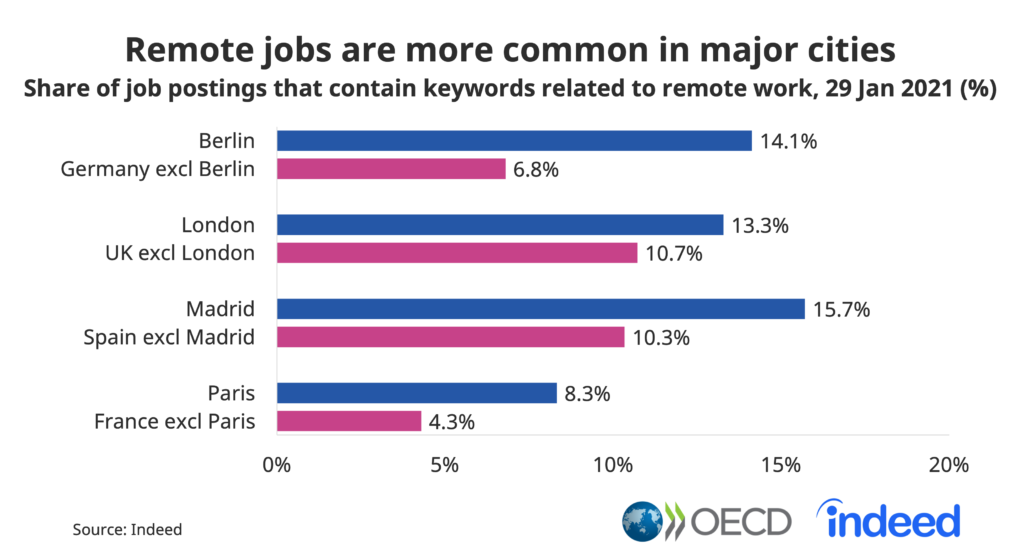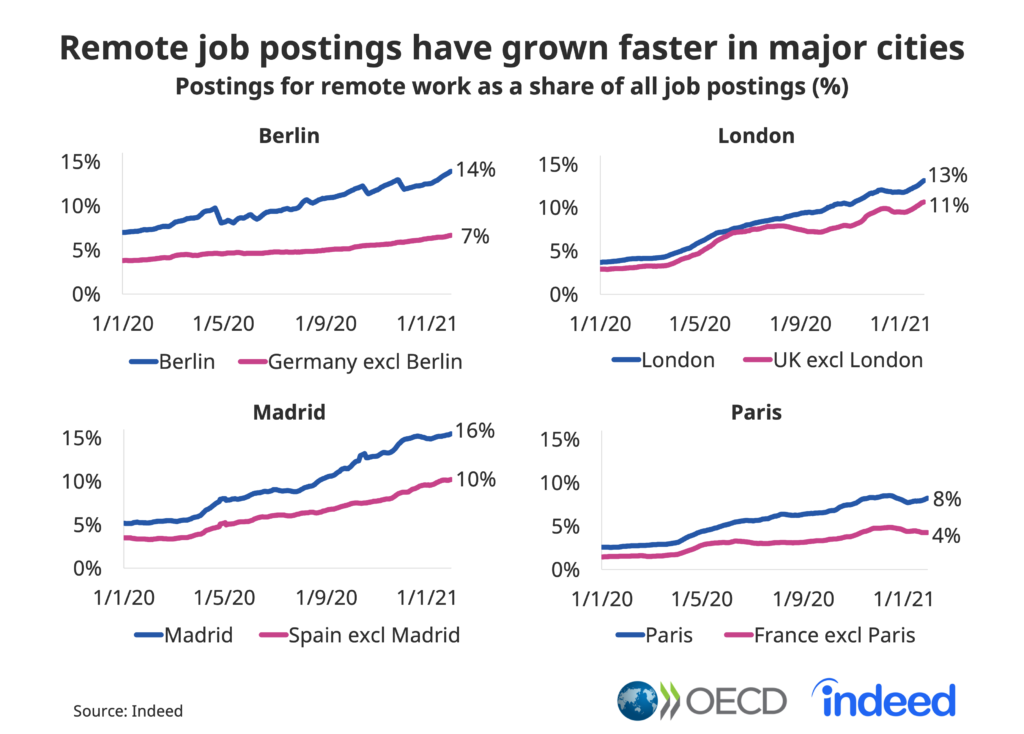Share this Post
City centres have been lying all but empty around the globe since the pandemic took hold. Shops shut. Office buildings deserted. But white-collar work has continued nonetheless, thanks to the great shift to remote work and the largely cloud-based technologies that have allowed it to happen.
Now, with vaccines being rolled out, the picture of a post-COVID world is slowly coming into focus — but even as some retail outlets and office buildings tentatively reopen, it seems that we are unlikely to return to the workplace in the same numbers as before.
Numerous large companies — including Facebook, Dropbox, Coinbase, Slack, and many more — have committed to long-term remote work, with many announcing that employees can continue to work from home permanently if they so wish. Smaller companies are following suit, raising an important question. Will the shape of our cities change if there were a permanent increase in working from home — and, if so, how?
Big City Exodus
If remote work is here to stay, it will have significant implications for where economic activity takes place. When people work from home rather than at the office in the city centre, their work-related consumption of goods and services will take place where they live, not where the office is. City-based restaurants, coffee shops, gyms, hair stylists, taxi services, even supermarkets, apparel outlets and grocery stores will all be affected as much of their clientele simply won’t be there before, during and after work, spending their money on-site. Instead, their spending is transferred to establishments located near where they live, or otherwise to ecommerce alternatives where applicable.
Already, traditionally office-based employees like tech workers have decided to trade in daily long commutes to smog-filled city centres for a new life in the countryside. The San Francisco Bay area, for instance, the so-called home of big tech, witnessed a net exit increase of 649% in the last nine months of 2020 compared to the same period in 2019 — from 5,200 net exits to 38,000.
The same thing was seen to happen on this side of the pond, with Europe’s big cities witnessing a similar exodus of residents. Driven by the ability to work from home, last year, an increasing number of people in Germany, for example, were hunting for homes in rural areas. Now, the country is drafting a law to give people the legal right to work from home.
In the UK, a recent survey has revealed that some 41% of Londoners have moved out of the city at some point during the pandemic. Another report found that tech workers left Dublin en masse last year to work remotely. 20% of Parisians moved out of the city, and around 10% of people left Madrid, Milan and Berlin, respectively.
Before the pandemic, only about 5% of Europeans worked from home full-time. Estimates now put that figure at 40% as a result of the pandemic, according to a report by the European Commission.
Fewer Jobs in Major Cities
Will workers be drawn back to cities? Not if the work isn’t there. A recent report from Indeed Hiring Lab reveals that the pandemic led to a sharp fall in job creation in major cities around Europe. At their lowest point, postings were down 26% in Berlin, 57% in London, 48% in Madrid and 42% in Paris. Though there has been a partial recovery, the report finds that hiring in these capitals remains subdued — through to the end of January 2021, job postings were down 8% year on year in Berlin, 25% in Madrid, 26% in Paris, and 41% in London.

Service occupations recorded the biggest job posting declines —Source: hiringlab.org
Meanwhile, remote work job postings have been steadily growing — particularly in Europe’s largest capitals. As of January 29, 2021, the share of postings containing keywords related to remote work was 3 to 7 percentage points higher in these cities compared to elsewhere in their respective countries, according to the report.

Share of job postings that contain keywords related to remote work —Source: hiringlab.org
The report also finds that the shift to remote work might last longer in major cities after the pandemic than elsewhere. When most European countries significantly eased health restrictions in the summer of 2020, sectors like retail and hospitality ramped up hiring, while remote job postings in Germany, France, Spain and the UK stopped growing at a national level. However, big cities bucked these national trends. Remote postings in Berlin, London and Paris kept climbing — and although Madrid did register a slowdown over the summer, over the course of the year, remote postings still grew more in the Spanish capital than in the rest of the country.

Postings for remote work as a share of all job postings —Source: hiringlab.org
The “15-Minute City”
While it is highly unlikely that city centres will empty out completely after COVID, the trends we are seeing almost certainly point to a post-pandemic world where cities are emptier. The pandemic, indeed, has changed how we relate to the office and how often we want to go there.
Even if the average worker only worked one day a week from home post-COVID, in major cities with millions of people, this would still have a significant impact — and the likelihood is that working from home two or three days a week for white collar workers will become the norm. If so, the result will be that economic activity becomes less geographically concentrated, and instead spread out across various residential neighbourhoods.
In cities themselves, as pointed out in the International New York Times, city planners are already preparing for a post-pandemic redesign to address problems that have long-plagued major urban centres — housing affordability, safe transportation and access to green space.
Features like widened pedestrian zones and cycle-friendly commuting options have been introduced in cities like Milan, London, and Barcelona to help people avoid the health risks of subways and buses — measures that, additionally, address long-standing complaints about noise and air pollution. In Paris, Mayor Anne Hidalgo has made strides to implement multi-lane biking highways, cut traffic near schools to improve air quality, and turn surplus car parking spaces into extended seating areas. The city is now vowing to make some of these pandemic redesigns permanent.
The report also quotes Malcom Smith, an urban design fellow with Arup, who argues that the pandemic has brought cities closer to a vision of the “15-minute city” — one where all necessary amenities exist a short walk from people’s front doors. Smith says that there is now potential to make less traffic, cleaner air, and more family time permanent features of urban life.
“[The pandemic] has shone a light on the importance of developing cities in smaller modules, with essential services concentrated around community hubs,” says Smith. “In the 19th century, the response to cholera in London brought big infrastructure, the sewer network. I hope COVID-19 will lead to lots of smaller scale but widespread interventions.”
Léan Doody, who leads the integrated cities and planning network for Europe at Arup, adds that there is an opportunity, as the end of the pandemic comes into view, to introduce new behaviours. “Perhaps city authorities, transport authorities and employers could think about policies to make a vision of the future that actually works for everyone.”
Enabling Hybrid Working — The Need for Cloud-Based ERP
For employers, the first step is to enable the hybrid working model — which will require the continued deployment of cloud-based digital business management, communication and productivity solutions, such as metasfresh Cloud ERP.
A cloud-based ERP system is indeed one of the most important and effective business management tools to make the digital transformations necessary to survive in the new remote working world a reality. metasfresh Cloud ERP is accessible from anywhere with an internet connection, and serves as the centralised hub for all business data from all departments — making key business information immediately accessible to all employees, no matter if they are at home or in the office.
With deep integration with other business applications and tools — such as your CRM, email marketing software, accounting and HR solutions, and more — metasfresh Cloud ERP gives all team members across all departments the necessary means to communicate and collaborate with each other, as well as with external buyers, suppliers and business partners.
Long-term changes to our cities are afoot, and the era of office-centricity could well be over. metasfresh Cloud gives organisations the agility, flexibility and visibility to not only survive in the new hybrid working world, but thrive in it.
Talk to us here at metasfresh to learn more about how metasfresh Cloud ERP can empower your workforce of the future. metasfresh is a member of the Ecommerce and Cross-Channel Club Cologne (ECC Club Köln), which is managed by the Institute for Retail Research Cologne (Institut für Handelsforschung, IFH Köln). The Institute offers individual research projects with strategic consulting. It specialises in the areas of inter-company comparisons as a controlling instrument, enabling retail companies to recognise market developments, measure changes in customer behaviour, optimise sales and set the course for a successful future. The insights and knowledge provided by the Institute through market research and studies relating to cross-channel and online retail are incorporated in the development of metasfresh, meaning all of our users are always up to date on the latest ecommerce developments.
Since 2006, we’ve been developing our ERP software non-stop with open source components and under the open source licences GPLv2 and GPLv3. Our mission is to enable each and every company to access a powerful ERP system that supports digital transformation and fuels corporate growth. Get in touch today for more information and insights.
Share this Post



